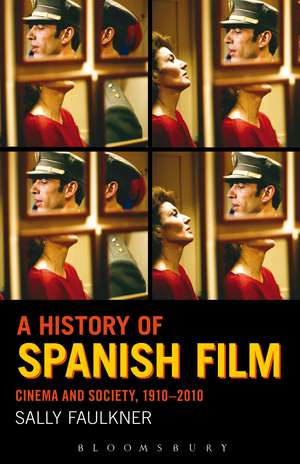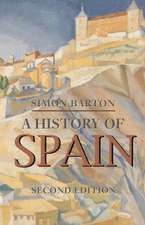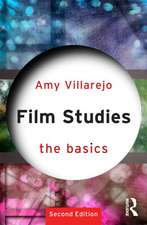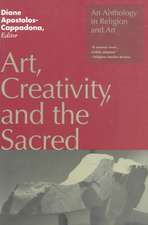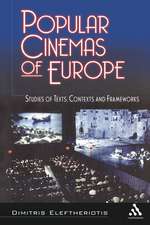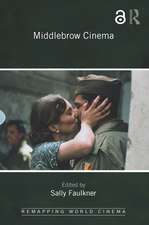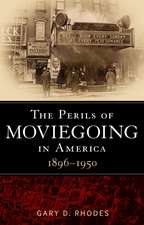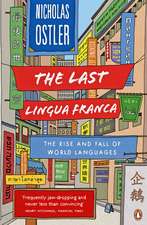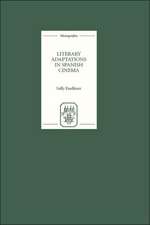A History of Spanish Film: Cinema and Society 1910-2010
Autor Professor Sally Faulkneren Limba Engleză Paperback – 5 iun 2013
Preț: 182.22 lei
Preț vechi: 208.93 lei
-13% Nou
Puncte Express: 273
Preț estimativ în valută:
34.87€ • 36.50$ • 28.85£
34.87€ • 36.50$ • 28.85£
Carte tipărită la comandă
Livrare economică 07-21 aprilie
Preluare comenzi: 021 569.72.76
Specificații
ISBN-13: 9780826416674
ISBN-10: 0826416675
Pagini: 336
Ilustrații: illustrations
Dimensiuni: 152 x 229 x 23 mm
Greutate: 0.52 kg
Editura: Bloomsbury Publishing
Colecția Bloomsbury Academic
Locul publicării:New York, United States
ISBN-10: 0826416675
Pagini: 336
Ilustrații: illustrations
Dimensiuni: 152 x 229 x 23 mm
Greutate: 0.52 kg
Editura: Bloomsbury Publishing
Colecția Bloomsbury Academic
Locul publicării:New York, United States
Caracteristici
Takes a somewhat controversial view that transnational influence is good for Spanish national cinema
Notă biografică
Sally Faulkner is Associate Professor of Hispanic Studies and Film at the University of Exeter, UK. She is the author of Literary Adaptations in Spanish Cinema (2004) and A Cinema of Contradiction: Spanish Film of the 1960s (2006) and was awarded a Fellowship from the British Arts and Humanities Research Council for 2011.
Cuprins
AcknowledgementsList of IllustrationsTextual NoteIntroduction: Cinema and Society 1910-2010Chapter 1. Questions of Class and Questions of Art in Early Cinema Blood and SandChapter 2. Social Mobility and Cinema of the 1940s and 1950s: Consolation and Condemnation Chapter 3. Charting Upward Social Mobility: 1960s Films about the Middle Classes and the MiddlebrowChapter 4. The 'Third Way' and the Spanish Middlebrow Film in the 1970sChapter 5. Miró Films and Middlebrow Cinema in the1980s Chapter 6: Middlebrow Cinema of the 1990s: From Miró to Cine social Chapter 7. From cine social to Heritage Cinema in Films of the 2000sAbbreviations and glossaryBibliographyIndex
Recenzii
A combination of painstaking research, theoretical awareness, critical aperçu and elegant writing.
There has been nothing quite like Sally Faulkner's A History of Spanish Film. This lengthy and ambitious volume combines a compelling general account of a vital national cinema with brilliant close analyses of individual titles. Moreover it skillfully places artistic and cultural questions within social and historical contexts. This book is required reading for both those who already know Spanish cinema and those who would like to discover it.
This beautifully nuanced study gives the reader a series of intriguing new perspectives on the social crossovers produced by a cinema marked by class mobility and by realignments in taste in Spain. It concentrates on the active engagement of middle class culture -- bizarrely under-estimated in most books on Spanish film -- with fictions, markets and institutions. Sally Faulkner's indispensable history reveals a different continuity and disparate set of Spanish images to the ones we might have thought we knew.
Faulkner's close textual analysis of a diverse array of films complements the books original and stimulating theoretical framework. A History of Spanish Film is a new and exciting contribution to intellectual discourses about class, modernity, and the production and reception of Spanish cinema. Students and scholars alike will find this work indispensable in their teaching and research.
Sally Faulkner's A History of Spanish Film is a moveable feast. Departing from the tendency to understand history as a rehearsal of grand ideologies and to view--and valorize--Spanish cinema in terms of denunciation and protest, subversion and experimentation, it charts the rise of the middle class and a corresponding 'middlebrow cinema'. Through an interlocking series of close, chronologically ordered readings of representative films in Spanish from before and after the Civil War, Faulkner's study grapples with complex questions of modernization, popular culture, education, entertainment, consumerism, class realignment, and social mobility --'upward,downward and stalled'-- in motion pictures.
This book uses the concept of Spanish middlebrow cinema to explore the representation of class and social mobility across a century of Spanish cinema... The close textual analysis in combination with a nuanced reading of production, reception and changes in taste in Spain gives new insights into a range of films, including those that have already had acres written about them... A really interesting read.
This is an attractive and balanced book that throws new insights into research.
There has been nothing quite like Sally Faulkner's A History of Spanish Film. This lengthy and ambitious volume combines a compelling general account of a vital national cinema with brilliant close analyses of individual titles. Moreover it skillfully places artistic and cultural questions within social and historical contexts. This book is required reading for both those who already know Spanish cinema and those who would like to discover it.
This beautifully nuanced study gives the reader a series of intriguing new perspectives on the social crossovers produced by a cinema marked by class mobility and by realignments in taste in Spain. It concentrates on the active engagement of middle class culture -- bizarrely under-estimated in most books on Spanish film -- with fictions, markets and institutions. Sally Faulkner's indispensable history reveals a different continuity and disparate set of Spanish images to the ones we might have thought we knew.
Faulkner's close textual analysis of a diverse array of films complements the books original and stimulating theoretical framework. A History of Spanish Film is a new and exciting contribution to intellectual discourses about class, modernity, and the production and reception of Spanish cinema. Students and scholars alike will find this work indispensable in their teaching and research.
Sally Faulkner's A History of Spanish Film is a moveable feast. Departing from the tendency to understand history as a rehearsal of grand ideologies and to view--and valorize--Spanish cinema in terms of denunciation and protest, subversion and experimentation, it charts the rise of the middle class and a corresponding 'middlebrow cinema'. Through an interlocking series of close, chronologically ordered readings of representative films in Spanish from before and after the Civil War, Faulkner's study grapples with complex questions of modernization, popular culture, education, entertainment, consumerism, class realignment, and social mobility --'upward,downward and stalled'-- in motion pictures.
This book uses the concept of Spanish middlebrow cinema to explore the representation of class and social mobility across a century of Spanish cinema... The close textual analysis in combination with a nuanced reading of production, reception and changes in taste in Spain gives new insights into a range of films, including those that have already had acres written about them... A really interesting read.
This is an attractive and balanced book that throws new insights into research.
